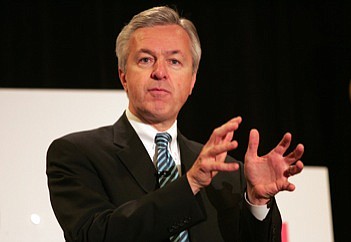- December 23, 2024
-
-
Loading

Loading

Wells Fargo is so eager to make loans it's taking a second look at those it already has turned down.
“The biggest challenge is finding good earning assets,” Wells Fargo Chairman, President and Chief Executive John Stumpf told a gathering of the Forum Club of Southwest Florida in Naples on March 5. He's ordered lending officers to take another look at loans they've turned down in the past to see whether applicants might be creditworthy today.
Stumpf acknowledged the widespread perception that banks aren't making loans, but he says it's because individuals and companies are paring debt and those who need money aren't credit worthy. “We simply can't find the loans today,” Stumpf says.
In some cases, such as the student-loan business, the government is muscling its way into the arena because it thinks it can do a better job. “We're now being invited out of the business,” Stumpf quips.
Since it acquired Wachovia in October 2008, Wells Fargo is the second-largest bank in Florida in terms of deposits, according to the latest data from the Federal Deposit Insurance Corp. It controls $64.3 billion in deposits in Florida as of June 2009, giving it a 16% market share in the state. behind Bank of America's 18% market share with $72.8 billion in deposits. “Wachovia was in dire shape when we bought them,” Stumpf recalls.
On the Gulf Coast, Wells Fargo is among the top three banks in every metropolitan area, ranked by deposit market share. It ranks first in Cape Coral-Fort Myers and Punta Gorda, second in Sarasota and Tampa and third in Naples-Marco Island.
Despite its significant presence in Florida, Stumpf says real estate continues to weigh on the state's economy. “Florida is still struggling,” he says. While real estate transactions have started to increase, values remain depressed. “They're moving at very low prices,” he says.
Still, Wells Fargo continues to invest in Florida. “We continue to build stores and hire bankers,” Stumpf says. Insurance and wealth management are two areas the bank plans to expand.
Nationally, Stumpf says he's concerned that businesses won't create jobs as fast following this recession. “This is my third rodeo, but this one is very different,” Stumpf says.
Jobs may not return as quickly this time because the U.S. manufactures fewer goods than it used to and the rebuilding of inventories will come from outside the country. “We don't manufacture a lot of stuff in this country anymore,” he says. “We order stuff from overseas.”
What's more, individuals and consumers are paying down debt while the federal government debt continues to balloon to monstrous proportions. “The big switch to saving has put a big hit on the economy,” Stumpf says.
Government intrusion into the market is likely to continue. “My suspicion is there will be more government involvement in a number of industries,” Stumpf says, pointing to health care as an example.
Stumpf wasn't shy about how he feels about government meddling. “I don't like anything that starts with a 'T' anymore,” says Stumpf, referring to the TARP bank bailout foisted onto banks.
In a swipe at rival banks on government life support, Stumpf says no business should be considered too big to fail. “Failure is a necessary and important part of capitalism,” he says. “You can't privatize the good stuff and nationalize the bad stuff.” Shareholders of failing companies should be wiped out to pay secured creditors so the government doesn't burden taxpayers.
Despite his criticism of government intervention, Stumpf called for increased regulation of industries such as mortgage brokers and payday lenders to level the playing field. He backs a consumer-protection agency that would regulate those businesses the same way banks are regulated.
Stumpf acknowledged bankers aren't well regarded these days. “We created the swine flu, global warming,” he jokes.
One of 11 children growing up on a farm in northern Minnesota, Stumpf regaled the crowd of retired executives with a few brief stories of his childhood. Between them, the Stumpf children slept in two bedrooms and he slept in one bed with two brothers. “I never got to sleep alone until I got married,” he joked.
—Jean Gruss